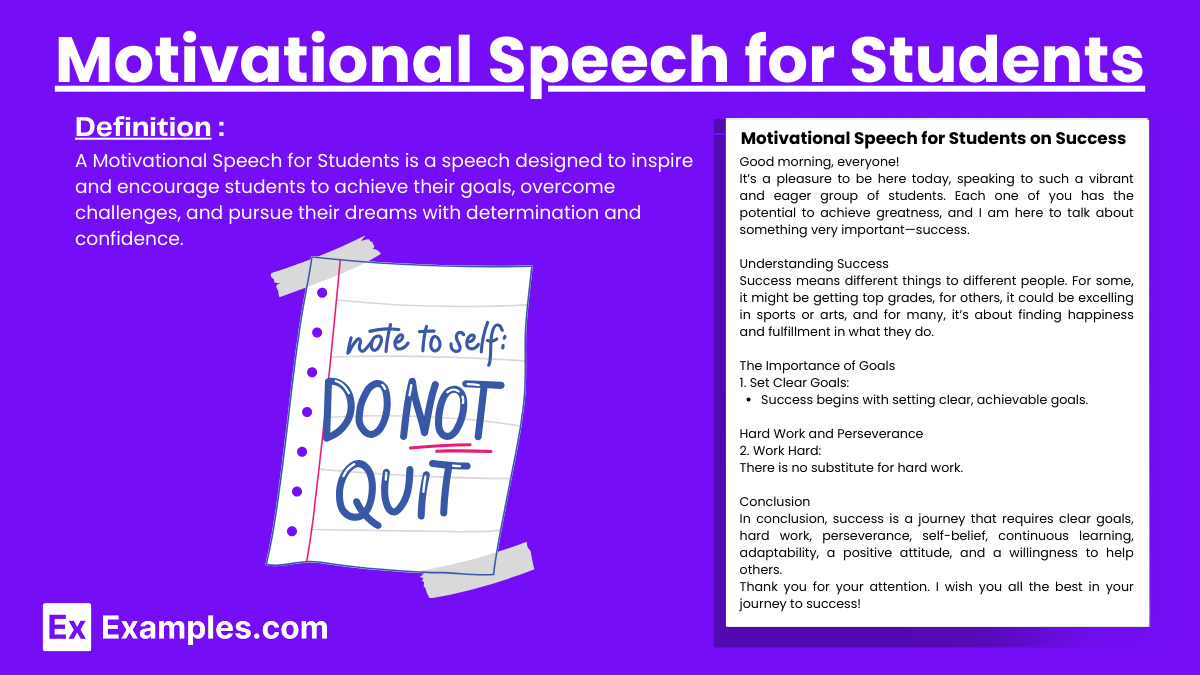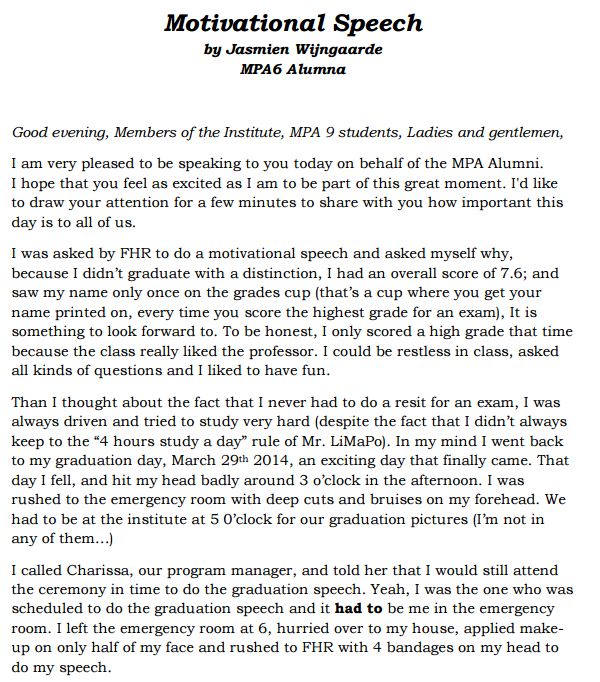19+ Motivational Speech for Students Examples
A motivational speech for students is a carefully crafted oration designed to inspire and encourage young individuals in their educational journey. The purpose of such a speech is to boost students’ confidence, ignite their passion for learning, and empower them to overcome challenges and achieve their goals.
What is Motivational Speech for Students?
A Motivational Speech for Students is a speech designed to inspire and encourage students to achieve their goals, overcome challenges, and pursue their dreams with determination and confidence. These speeches are often delivered by teachers, principals, alumni, guest speakers, or motivational speakers and are tailored to address the unique challenges and opportunities faced by students.
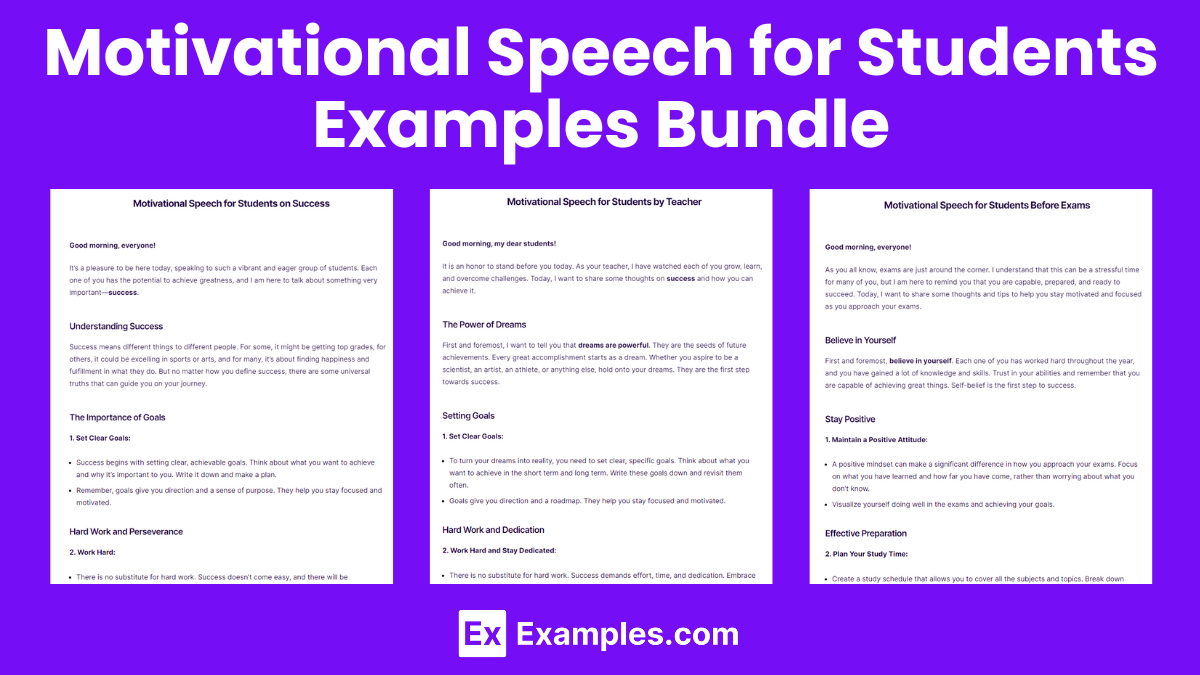
Motivational Speech for Students Bundle Download
Motivational Speech for Students Format
1. Introduction
Greeting: Warmly welcome the audience.
Purpose: State the purpose of your speech.
2. Personal Stories and Examples
Anecdotes: Share relatable personal stories or examples.
Relatability: Connect stories to the students’ experiences.
3. Encouragement and Inspiration
Positive Messages: Emphasize positive thinking and perseverance.
Overcoming Obstacles: Discuss overcoming challenges and setbacks.
4. Practical Advice
Goal Setting: Provide tips on setting and achieving goals.
Time Management: Offer advice on managing time effectively.
Self-Discipline: Highlight the importance of self-discipline and hard work.
5. Call to Action
Motivate: Encourage students to take specific actions towards their goals.
Empower: Empower students to believe in their potential and abilities.
6. Conclusion
Summary: Recap the key points.
Inspiration: End with an inspiring message or quote.
Motivational Speech for Students Example
Short Motivational Speech for Students Example
Motivational Speech for Students on Success
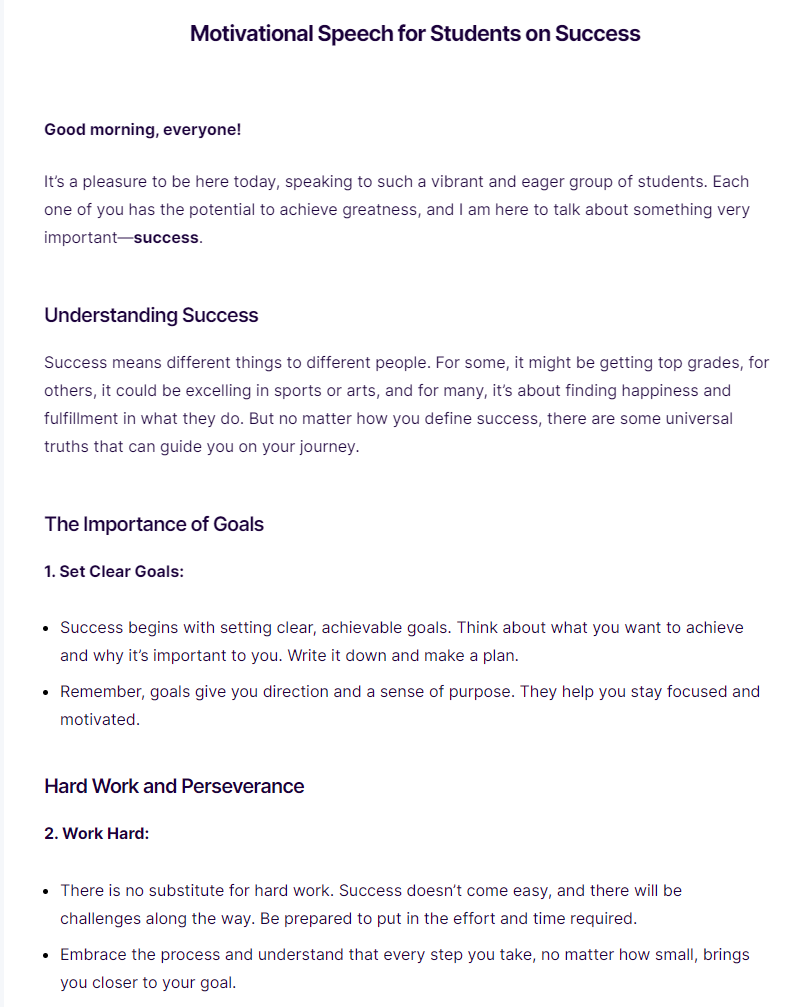
Motivational Speech for Students by Teacher
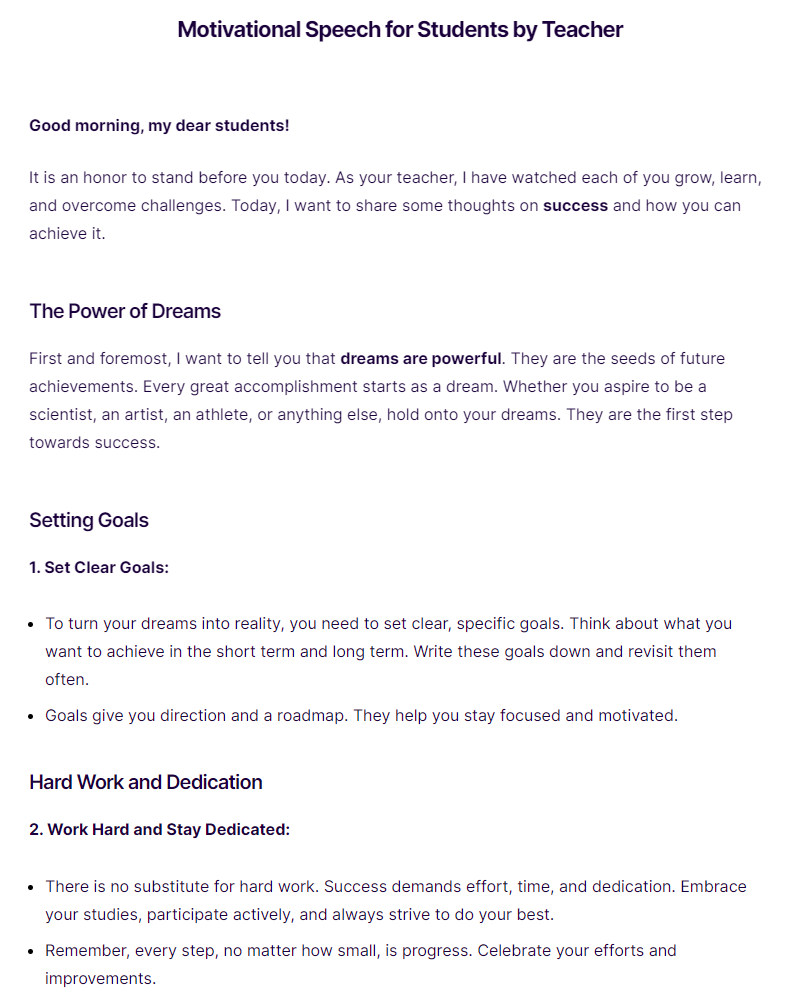
Motivational Speech for Students Before Exams
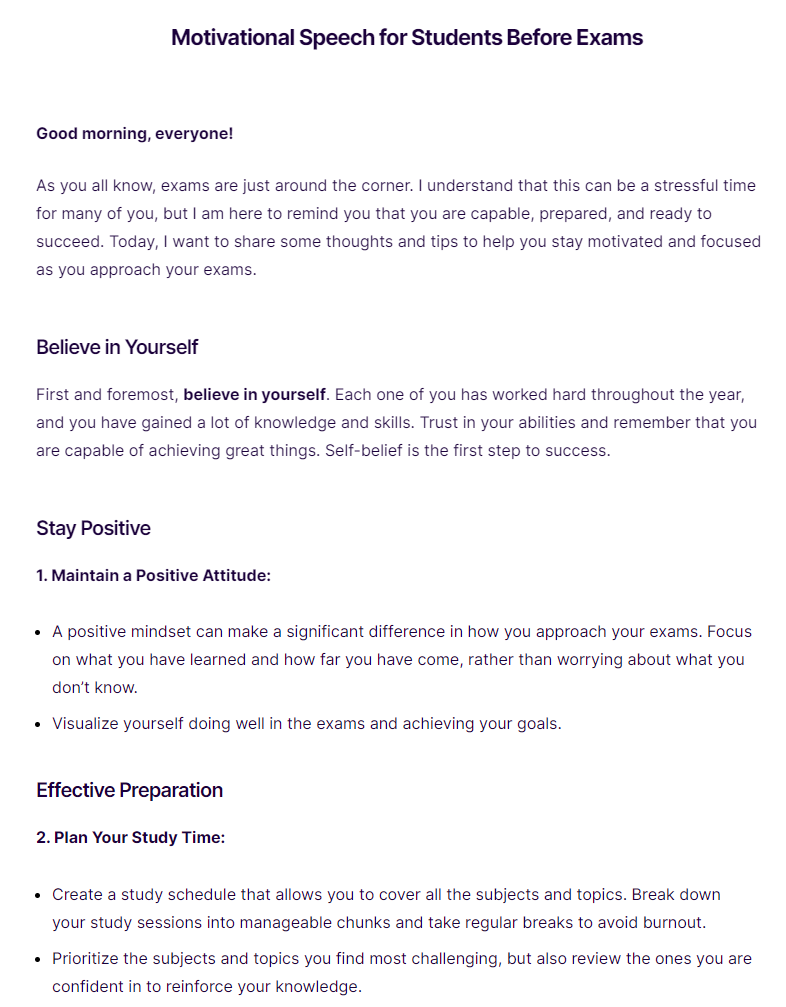
More Motivational Speech for Students Topics
- Motivational Speech for Students on Hard Work
- Motivational Speech for Students on Overcoming Challenges
- Motivational Speech for Students on Exam Preparation
- Motivational Speech for Students by Guest Speaker
- Motivational Speech for Students on Career Goals
- Motivational Speech for Students on Time Management
- Motivational Speech for Students on Positive Thinking
- Motivational Speech for Students on Goal Setting
- Motivational Speech for Students on Team Work
- Motivational Speech for Students on Leadership
- Motivational Speech for Students on Academic Excellence
- Motivational Speech for Students on Building Confidence
Motivational Speech Example
How to Write Motivational Speech for Students
1. Understand Your Audience
Know who you are speaking to: Understand the age group, interests, and challenges of the students.
Identify the purpose: Are you motivating them for exams, encouraging them to follow their dreams, or helping them overcome obstacles?
2. Start with a Strong Opening
Capture their attention: Use a quote, an interesting fact, or a personal anecdote.
Set the tone: Make it clear that the speech will be uplifting and positive.
3. Establish a Connection
Be relatable: Share a personal story or an experience that the students can connect with.
Show empathy: Acknowledge their struggles and challenges.
4. Deliver the Core Message
Keep it simple and clear: Focus on one or two main points.
Use inspiring language: Choose words that are uplifting and motivating.
Include key themes: Belief in oneself, perseverance, setting goals, and the value of education.
5. Use Engaging Techniques
Ask rhetorical questions: Engage students by prompting them to think.
Use repetition: Reinforce the key message by repeating it in different ways.
Incorporate quotes: Use motivational quotes to emphasize points.
6. Conclude with a Call to Action
Encourage action: Motivate students to take specific steps toward their goals.
End on a high note: Leave them feeling inspired and ready to take on challenges.
Tips to Deliver Motivational Speech for Students
1. Have a Point in Your Speech
- Clearly define the main message you want to convey.
- Focus on a central theme, like “not giving up despite failures.”
2. Put Structure in Your Speech
- Use a beginning, middle, and end.
- Create an outline and label key points.
- Introduce your main points early on.
3. Connect with Your Audience
- Relate to the students’ age, interests, and challenges.
- Engage emotionally and show empathy.
- Use simple, respectful language.
4. Avoid Making Your Speech a Narrative Essay
- Make your speech engaging and easy to follow.
- Write it like poetry or lyrics, with new thoughts on new lines.
5. Tell a Story, Especially Your Own
- Share personal achievements and struggles.
- Relate your story to the students’ experiences.
6. Practice Your Speech
- Familiarize yourself with the content.
- Maintain eye contact and connect with the audience.
7. Join a Local Toastmasters Club
- Practice speaking skills in front of a live audience.
- Gain confidence in public speaking.
8. Own the Stage
- Be confident and engaging.
- Inspire students to follow your advice.
9. Keep it Simple
- Focus on a strong, memorable message.
- Avoid unnecessary props or costumes.
Why are motivational speeches important for students?
Motivational speeches boost students’ confidence, resilience, and drive, helping them stay focused on their academic and personal goals.
Who can give a motivational speech to students?
Teachers, motivational speakers, successful alumni, and community leaders can give motivational speeches to students.
What should a motivational speech for students include?
A motivational speech should include inspiring stories, practical advice, encouragement, and a call to action.
How can a motivational speech improve student performance?
Motivational speeches can improve student performance by increasing their self-belief, motivation, and determination to succeed.
What is the best time to deliver a motivational speech to students?
Deliver motivational speeches at the beginning of the school year, before exams, or during challenging periods.
How do you engage students in a motivational speech?
Engage students by using relatable stories, interactive elements, and addressing their specific needs and concerns.
Can motivational speeches help students with low self-esteem?
Yes, motivational speeches can help students with low self-esteem by reinforcing their value and potential.
What role do personal stories play in a motivational speech?
Personal stories make the speech relatable and memorable, illustrating how challenges can be overcome.
How long should a motivational speech for students be?
A motivational speech for students should be between 10 to 20 minutes to maintain their attention and interest.
How often should students hear motivational speeches?
Students should hear motivational speeches regularly, such as once per semester or during key school events.



